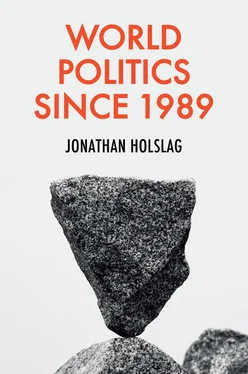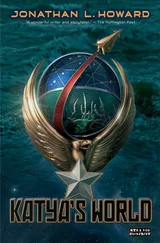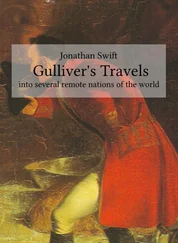The end of history will be a very sad time. The struggle for recognition, the willingness to risk one’s life for a purely abstract goal, the worldwide ideological struggle that called forth daring, courage, imagination, and idealism, will be replaced by economic calculation, the endless solving of technical problems, environmental concerns, and the satisfaction of sophisticated consumer demands. In the post-historical period, there will be neither art nor philosophy, just the perpetual caretaking of the museum of human history. I can feel in myself, and see in others around me, a powerful nostalgia for the time when history existed. 32
Western liberalism became materialism. Progress was measured by the degree not to which the world advanced human dignity, but to which it encouraged people to consume. Pope John Paul II stated that if Marxist materialism had failed to succeed, liberal capitalism was bound to fail to meet the profound aspirations of humanity. “Some have seen the fall of Communism in Eastern Europe as a victory of liberal capitalism and now see the latter as the only road, forgetting the very limited contribution it makes to a full human life, let alone the devastating consequences it has for the third world.” 33French President François Mitterrand put it thus: “It would be disastrous to assist one cultural model to become universal. Will we allow that the law of money, the forces of technology, will succeed in what totalitarian regimes failed to do?” 34
Even die-hard proponents of capitalism stated that the advance of Western economic and political values would not succeed without a deeper moral and cultural code. “It needs the energies of the creative imagination as expressed in religion and the arts,” Irving Kristol stated. “It is crucial to the lives of all our citizens, as of all human beings at all times, that they encounter a world that possesses a transcendent meaning, in which the human experience makes sense.” 35Sociologist Seymour Martin Lipset posited that spreading democracy could provoke a backlash. Promoting economic liberalism is important, he stated, but not enough. Democracy requires inclusive prosperity, meritocracy, culture, civic education, moderation, and emancipated citizens. He warned: “Do not count on all the world’s democracies lasting.” 36
Others took as evidence of the moral crisis the growing inequality, particularly in the United States and the United Kingdom. A leading economist calculated that the richest 1 percent had amassed 70 percent of the rise in family income in the 1980s. Wallace Peterson found the real income of a worker in 1990 to be 20 percent lower than in 1973. 37 Newsweek ran an article that scathingly confronted America with its poverty. “Nineteen nations have better infant mortality rates than the United States. The infant death rate in Japan is less than half the American rate,” it summarized. “The infant death rate in the nation’s capital, and in Detroit and Baltimore, is humiliatingly close to a Third World rate. Nothing that happens in Bangladesh should be as interesting to Americans as the fact that a boy born in Harlem today has a lower life expectancy than a boy born in Bangladesh.” 38Rich coastal Democrat America sometimes replaced the backward communists with narrow-minded rural deplorables. Rich and Republican America often replaced the backward communists as their principal enemies with backward poor. 39
Many of these backward communities consisted of immigrants. Hence, doubts grew about the image of Western society as a multicultural melting pot. The idea of such cultural blending originated from the time of Henry Ford. During an opening ceremony of a school for migrant workers in 1917, Ford let foreigners in native dress descend into a large black vessel named “The American melting pot.” That was a little more than 70 years earlier, when the United States felt confident and strong. By the 1980s, the melting pot was no longer melting. 40This was also the case in Europe. Throughout the West, immigrants lagged behind in terms of education and prosperity. The frustration about the failing integration of immigrants was enforced by a growing fear of Islam. “The Muslims are Coming!” a magazine ran as a cover story. 41Next to the title, whose initial version was titled “Out Go the Commies, In Come the Muslims,” was a picture of a dozen Arabs riding camels in a desert. As the far right gained ground, center politicians panicked. The French presidential candidate Jacques Chirac claimed to understand the feelings of workers who were tired of the smell and noise of immigrants. 42After the clash with communism, the Western world was brewing its own internal clash of civilizations. 43
It was also feared that unrestrained capitalism would be catastrophic for the environment. Economists lamented the fact that prices of products in supermarkets did not include external costs. 44While companies tried to compete by pricing products as cheaply as possible, they transferred the cost of pollution to tax payers. Private investors took the profits of capitalism; society was expected to pay for its problems. Such a distorted market, the criticism went, discouraged producers from innovating, from implementing more sustainable technologies, and from reducing the waste of precious resources. Raw materialism, it was called. This concern was not new. The Club of Rome, a group of political and corporate influencers, had concluded that there were limits to growth. It derided the mismanagement of the world economy, including the diffusion of toxic substances, the acidification of lakes, the cutting of forests, and global warming. 45At the Rio Summit in 1992, its secretary-general said: “One part of the world cannot live in an orgy of unrestrained consumption where the rest destroys its environment just to survive. No one is immune from the effects of the other.” A real free market would redress these market failures. This concern occupied the public at large. In different surveys, the environment was identified as a priority. 46
The end of the Cold War was not a victorious period. There were concerns about the state of Western society, its economy, and its democracy. The West was seen as being on a slippery slope, a slippery slope down. A first critique that resonated through the Western world at the beginning of the 1990s was that the capitalist system had flaws. Inequality could become as problematic a misallocation of production factors as the forced misallocation that brought communism to a collapse. The consequent question that many asked was whether the West still had the moral leadership to solve that problem or whether it had already grown too complacent. Either way, it could not afford paralysis. The Soviet Union might have disappeared; the unipolar moment of almost uncontested power could be very brief in a world where new competitors continuously tried to improve their position. Barely had the cheers about the collapse of the Soviet Union subsided, or opinion makers predicted that Western power was set to decline, than preponderance would soon make way for a new stage of competition. Complacency, consumerism, and persistent provincialism would make matters worse.
Challenges on the horizon?
Concerns about the internal problems thus led to concerns about the position of the West in the world. The United States had the power resources to lead. Trade and investment made countries more dependent on one another. But interdependence required Americans to have an open attitude toward the world, to invest in international institutions. 47It was questioned whether the United States was able to act like a leader, not so much because of its natural penchant for isolationism, but because internal uncertainty aggravated a tendency to introversion. 48Books whose covers promised American leadership carried sobering analyses inside, monodies about America’s economic fragility and how it all crippled its capability to compete with new economic challengers. 49
Читать дальше

![Деннис Лихэйн - Когда под ногами бездна [Since We Fell ru]](/books/25722/dennis-lihejn-kogda-pod-nogami-bezdna-since-we-fe-thumb.webp)










